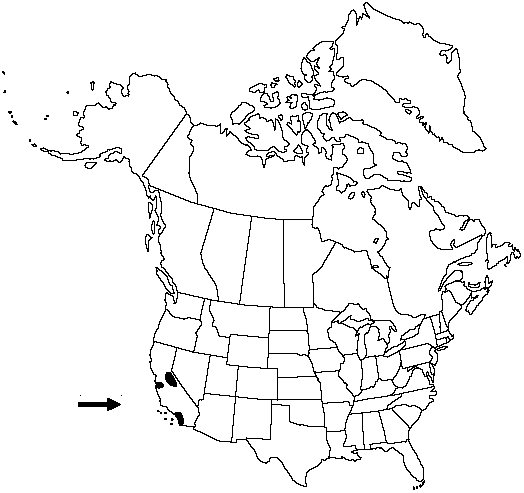Difference between revisions of "Ophioglossum californicum"
Ber. Deutsch. Bot. Ges. 1: 355. 1883.
FNA>Volume Importer |
imported>Volume Importer |
||
| (7 intermediate revisions by 2 users not shown) | |||
| Line 12: | Line 12: | ||
|name=Ophioglossum lusitanicum subsp. californicum | |name=Ophioglossum lusitanicum subsp. californicum | ||
|authority=(Prantl) R. T. Clausen | |authority=(Prantl) R. T. Clausen | ||
| + | |rank=subspecies | ||
}} | }} | ||
|hierarchy=Ophioglossaceae;Ophioglossum;Ophioglossum californicum | |hierarchy=Ophioglossaceae;Ophioglossum;Ophioglossum californicum | ||
| Line 20: | Line 21: | ||
}}<!-- | }}<!-- | ||
| − | --><span class="statement" id="st- | + | --><span class="statement" id="st-undefined" data-properties=""><b>Roots </b>to 16 per plant, pale brown, 0.5-1 mm diam., producing proliferations. <b>Stem</b> upright, to 1.6 cm, 5mm diam., commonly 2 leaves per stem. <b>Trophophore</b> stalk 0-1.8cm, to 2.5 times length of trophophore blade. <b>Trophophore</b> blade erect to spreading, commonly ± folded when alive, green, dull, without pale central band when dried, to 4.3 × 1 cm (rarely 0.4 × 0.3 mm), herbaceous, thick, gradually tapering to base, apex attenuate; venation complex-reticulate, with numerous parallel narrow areoles, each with 1-several included veinlets. <b>Sporophores</b> arising near ground level, 1-2.5 times length of trophophore; sporangial clusters 8-15 × 1-3 mm, with 8-15 pairs of sporangia, apiculum 0.3-1 mm.</span><!-- |
-->{{Treatment/Body | -->{{Treatment/Body | ||
| + | |phenology=Leaves appearing in late winter and early spring; apparently absent during dry years. | ||
|habitat=Open grassy fields and prairies | |habitat=Open grassy fields and prairies | ||
|elevation=50-300 m | |elevation=50-300 m | ||
|distribution=Calif.;Mexico. | |distribution=Calif.;Mexico. | ||
| − | |discussion=<p>Ophioglossum californicum differs from the Old World species O. lusitanicum in that O. lusitanicum has a narrowly linear to linear-oblanceolate trophophore that is 1/4 to 1/2 as wide as long; O. lusitanicum also has a much simpler venation and usually lacks an apiculum.</p> | + | |discussion=<p><i>Ophioglossum californicum</i> differs from the Old World species O. lusitanicum in that O. lusitanicum has a narrowly linear to linear-oblanceolate trophophore that is 1/4 to 1/2 as wide as long; O. lusitanicum also has a much simpler venation and usually lacks an apiculum.</p> |
|tables= | |tables= | ||
|references= | |references= | ||
| Line 35: | Line 37: | ||
-->{{#Taxon: | -->{{#Taxon: | ||
name=Ophioglossum californicum | name=Ophioglossum californicum | ||
| − | |||
|authority=Prantl | |authority=Prantl | ||
|rank=species | |rank=species | ||
| Line 42: | Line 43: | ||
|basionyms= | |basionyms= | ||
|family=Ophioglossaceae | |family=Ophioglossaceae | ||
| + | |phenology=Leaves appearing in late winter and early spring; apparently absent during dry years. | ||
|habitat=Open grassy fields and prairies | |habitat=Open grassy fields and prairies | ||
|elevation=50-300 m | |elevation=50-300 m | ||
| Line 49: | Line 51: | ||
|publication year=1883 | |publication year=1883 | ||
|special status= | |special status= | ||
| − | |source xml=https:// | + | |source xml=https://bitbucket.org/aafc-mbb/fna-data-curation/src/2e0870ddd59836b60bcf96646a41e87ea5a5943a/coarse_grained_fna_xml/V2/V2_54.xml |
|genus=Ophioglossum | |genus=Ophioglossum | ||
|species=Ophioglossum californicum | |species=Ophioglossum californicum | ||
| − | |||
| − | |||
| − | |||
| − | |||
| − | |||
| − | |||
| − | |||
| − | |||
| − | |||
| − | |||
| − | |||
| − | |||
| − | |||
| − | |||
| − | |||
| − | |||
| − | |||
| − | |||
| − | |||
| − | |||
| − | |||
| − | |||
| − | |||
| − | |||
| − | |||
| − | |||
| − | |||
| − | |||
| − | |||
}}<!-- | }}<!-- | ||
-->[[Category:Treatment]][[Category:Ophioglossum]] | -->[[Category:Treatment]][[Category:Ophioglossum]] | ||
Latest revision as of 20:24, 5 November 2020
Roots to 16 per plant, pale brown, 0.5-1 mm diam., producing proliferations. Stem upright, to 1.6 cm, 5mm diam., commonly 2 leaves per stem. Trophophore stalk 0-1.8cm, to 2.5 times length of trophophore blade. Trophophore blade erect to spreading, commonly ± folded when alive, green, dull, without pale central band when dried, to 4.3 × 1 cm (rarely 0.4 × 0.3 mm), herbaceous, thick, gradually tapering to base, apex attenuate; venation complex-reticulate, with numerous parallel narrow areoles, each with 1-several included veinlets. Sporophores arising near ground level, 1-2.5 times length of trophophore; sporangial clusters 8-15 × 1-3 mm, with 8-15 pairs of sporangia, apiculum 0.3-1 mm.
Phenology: Leaves appearing in late winter and early spring; apparently absent during dry years.
Habitat: Open grassy fields and prairies
Elevation: 50-300 m
Distribution

Calif., Mexico.
Discussion
Ophioglossum californicum differs from the Old World species O. lusitanicum in that O. lusitanicum has a narrowly linear to linear-oblanceolate trophophore that is 1/4 to 1/2 as wide as long; O. lusitanicum also has a much simpler venation and usually lacks an apiculum.
Selected References
None.